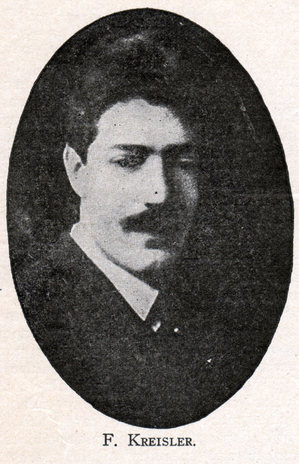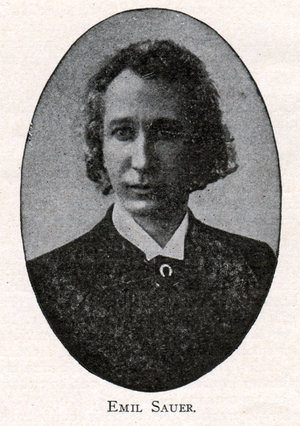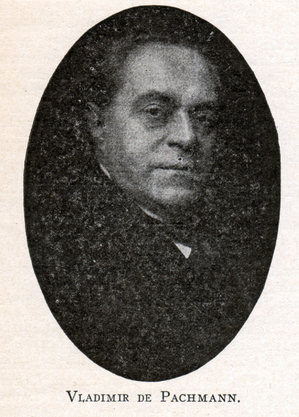In a recent issue of The Strand Magazine several of the most noted virtuosos of the day contributed to a symposium entitled, “The Piece I Most Enjoy Playing.”
The following is in part taken from the statements of those artists who are known to “American” readers:
 Fritz Kreisler.
Fritz Kreisler. I have no hesitation in saying that my favorite pieces, and those that I enjoy playing more than any others, are the Concertos of Beethoven and Brahms, because they are the very finest pieces of music ever written for the violin. No words of mine could express all the beauties that I find in these two magnificent Concertos or all the admiration I feel for the extraordinary genius of these two great masters. Nor do they need any admiration of mine, since their greatness speaks for itself. In the case of the Brahms Concerto there are associations, also, which make it dear to me, for I used to know the great composer in Vienna. But, as for the Beethoven Concerto, it has for me no associations except its beauty.
Mark Hambourg.
I have two favorite pieces. The first is the Fantasia of Schumann, Op. 17;the second is the B Flat Minor Sonata of Chopin with the Funeral March. Both of these works depict for me the various periods of a hero’s life. In the first case the work is divided into three great sections. The opening allegro is fantastic and passionate, based on a restless figure, worried by strenuous syncopated melodies. It is interrupted by a folk-song melody or legend, and, after some development, returns to the main theme. The second part is a moderato of mighty chords and massive harmonies, which remind one of a triumphal march, and the final movement is a lento in which is expressed a restful, peaceful mind.
To an artist’s imagination the work is like a canvas on which three periods of a hero’s life are painted. In the first he is pictured battling with life, an enormous amount of energy and enthusiasm helping him through; in the second he is depicted as a conqueror, having surmounted all difficulties; while the third shows him living happy and contented, having accomplished his life’s work and being at peace with all the world, though subdued and soothing echoes of his great past ever and anon sound in his ears.
The hero I have just described as being illustrated by Schumann in the Fantasia was of the sturdy, undismayable Teutonic kind. Chopin in his B Flat Minor Sonata also depicts the life of a hero, but this time the hero is a Pole. The national characteristic of the Pole is his inability to win success in the face of adverse circumstances. So long as all goes well he is as triumphant as anybody, but the first reverse throws him to the ground. Chopin’s hero, then, is a Pole, with overstrung nerves and imagination, to whom the ideals of life are love and war. After great sufferings and defeats he dies in morbid despair. Wonderfully expressed in the finale we hear the whispering of spirits over his grave.
 Emil Sauer.
Emil Sauer. The piece I enjoy playing most is Chopin’s B Flat Minor Sonata with the Funeral March. As a piece of interpretation it appeals to me very deeply indeed, and I find it a most exacting piece to play. So entirely lost do I become in the music when interpreting it that during the Funeral March I seem to see the coffin being borne along on its hearse and the mourners walking slowly behind it, while the finale means for me the sound of the wind sweeping through the grass upon the grave.
So intensely do I feel the music that my spine creeps and I become quite cold. I live through it! I see it all quite plainly before me, and although I can play the most tiring and difficult show pieces without getting hot, yet after playing the Funeral March I am invariably bathed in perspiration from the sheer excitement and feeling that the music arouses in me.
During my short tour in England last winter I played several times in Scotland. On one of these occasions the Sonata in B Flat Minor was on the programme. When I came to the Funeral March there suddenly flashed into my mind the remembrance of my little boy, beloved so dearly by my wife and I, who, alas! died a little while ago. On that instant the piece had a new meaning for me. I forgot the concert hall, the piano, and the audience, and my whole soul went out to converse through the music with my little child. As the piece went on it must have become evident to every member of the audience that I was being carried out of myself, for, although up till then there had been a good deal of coughing, a great hush fell upon the hall, and each note seemed to wake an echoing throb in the hearts of the listeners.
The last two chords of the final movement seemed to me to gently breathe my dead child’s name, and as the last note died away into silence a long sigh of pent-up emotion went up from all parts of the house, followed immediately by such a storm of applause as, I think, has never before been accorded me. Even rough workmen in the gallery, so I was told afterwards, became so filled with the knowledge that something unusual was passing that the tears welled up in their eyes, to be wiped away surreptitiously with their grimy hands or to roll unheeded down their weather-beaten cheeks.
Richard Buhlig.
The knowledge as to which is the piece of music I most enjoy playing was brought home to me very forcibly last year, when I was rehearsing one morning at Bournemouth for a concert there that afternoon, which I gave just before leaving England for America. When the orchestra commenced to play it I was moved to an extraordinary degree for I had not performed the work in public or in practice since I included it on the programme of my first London recital two years before. My thoughts as the piece progressed during the rehearsal referred to was—”How terrible not to have played or heard it for so long! I have listened to no music for two years !“ As a matter of fact, the work I am speaking of, which is Brahms’ B Flat Concerto, has peculiar associations for me. I remember very vividly indeed the first occasion on which I ever heard it performed. I was quite a boy at the time, and hearing it played in America by Joseffy, received such a wonderful impression that from that moment the whole of my musical ambition was centered in being able to perform it. During the years that succeeded I never lost sight of this ambition. I performed the work for the first time in public about four years ago in Berlin, and now each year that passes and each time I hear or perform the work enhances the keen musical enjoyment that it affords me.
The knowledge as to which is the piece of music I most enjoy playing was brought home to me very forcibly last year, when I was rehearsing one morning at Bournemouth for a concert there that afternoon, which I gave just before leaving England for America. When the orchestra commenced to play it I was moved to an extraordinary degree for I had not performed the work in public or in practice since I included it on the programme of my first London recital two years before. My thoughts as the piece progressed during the rehearsal referred to was—”How terrible not to have played or heard it for so long! I have listened to no music for two years !“ As a matter of fact, the work I am speaking of, which is Brahms’ B Flat Concerto, has peculiar associations for me. I remember very vividly indeed the first occasion on which I ever heard it performed. I was quite a boy at the time, and hearing it played in America by Joseffy, received such a wonderful impression that from that moment the whole of my musical ambition was centered in being able to perform it. During the years that succeeded I never lost sight of this ambition. I performed the work for the first time in public about four years ago in Berlin, and now each year that passes and each time I hear or perform the work enhances the keen musical enjoyment that it affords me.
Leopold Godowsky.
To name one’s favorite piece would be quite an easy matter if one did so in a merely off-hand way, for it would only be necessary to select at random one of the many pieces the playing of which gave one pleasure. But if one is to reply conscientiously the task is very difficult indeed. The pianist is necessarily a man of moods, and the piece which happens to appeal particularly to him on any given day may not do so twenty-four hours later. Thus, if you were asked on Monday what your favorite piece was, you might name the Beethoven Sonata, because it appealed to the particular frame of mind you happened to be in. Were the question repeated on Tuesday, your choice might fall on something entirely different, and the same thing may be said of every day in the week.
I have always thought that the custom of arranging weeks beforehand what pieces are to be included on the programme of a concert is almost a barbarous one. The man who is used to dining continually at restaurants would utterly resent it were his dinner selected for him two or three weeks in advance.
The ideal method would be to have no programme at all. He could then announce from the platform whatever he felt inclined to play. In this way he would be ever so much more likely to do himself justice and to please the public than is the case when he is forced to perform many pieces which do not fit his humor.
It is with considerable diffidence, therefore, that I choose as my favorite piece the B Flat Minor Sonata of Chopin, Op. 58, (sic) and I do so knowing, that were I to choose again a week or even a day hence my choice might fall upon a different piece altogether.
 Vladimir de Pachmann.
Vladimir de Pachmann. How can I choose my favorite piece? C’est impossible! It is out of the question! It is a monstrous proposition! For I love all music, and I play all music equally well. Chopin? Yes, it is beautiful; but I will not choose Chopin because it annoys me so that the public seem invariably to associate me with the music of that master, as though I could not play all masters. Ah, how can I choose? My mind wanders from one piece to another, like a bee that flits from flower to flower and gathers honey from each. As I think of the exquisite music of Weber I am on the point of selecting some piece of his, when suddenly in my ear there comes the sound of some of Strauss’s charming waltzes. Think of it; five different waltzes embodied in one, and all played at the same time! No one but myself can play it!
Yet perhaps I love best of all the arrangements of Godowsky—every one superb, magnifique, colossal! I will not choose any one of them, for I love and admire them all, but I will merely select as my favorites the unique arrangements of my friend, the great Godowsky.
Miss Marie Hall.
From the point of view of the music alone I think it would be exceedingly difficult for any instrumentalist to say that any one piece was his or her favorite, and I cannot help thinking that in almost every case where favoritism exists in an artist’s mind it is due to association more than to anything else. At any rate, so far as I am concerned, I must admit that this is the case and when I name as my favorite piece Paganini’s Concerto in D it is because it is associated with some of the earliest recollections of my childhood.
In my early days I used always to be playing this Concerto because the piece is one of great technical difficulty, and is therefore of a showy nature. The playing of such a difficult piece by a little girl never failed to create surprise and win reward, and, as in those days money was scarce, I was frequently made to play this piece before people. When I look back upon the time of my early struggles, and think of the numerous occasions when I and my family would have gone supperless to bed had it not been for Paganini’s Concerto, is it wonderful that it should rank very highly in my affections, and that whenever I turn over its pages or play it in private or in public a lump rises in my throat and a tear wets my lashes at the recollections it calls up?
I. J. Paderewski.
Two very favorite pieces of mine are Chopin’s Ballade in A Flat and the Fantasie in F Minor. I am exceedingly fond of all the Ballades, for to me they are filled with a beauty all their own, and are as full of meaning as the ballads, or stories told in verse, of which every nation has its share. Chopin tells a story in each of his Ballades, but he expresses himself in music instead of in words, although the meaning is just as clear to those with musical insight as though every note was a word.
The Fantasie in F Minor is perhaps rather a sad piece to choose as a favorite, but it is very beautiful all the same. One seems to listen, in it, to the story of some lover whose heart is lost irrevocably to one who does not requite his affection. Every emotion likely to be felt by such a one is expressed in the Fantasie, and one is carried from joy to despair and from despair to joy again, until one’s heart is stirred to its depths by the subtle romance with which the work is impregnated.
Poetry, poetry, poetry! Here is the secret of the ability of any given piece to give pleasure to its player or his audience, and I know no keener enjoyment, so far as music is concerned, than to play the Fantasie—independently of whether there is an audience or not.



